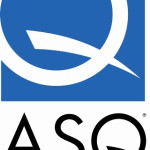- Sektör: Quality management
- Number of terms: 21751
- Number of blossaries: 0
- Company Profile:
American Society for Quality (ASQ) is a global community of quality management professionals. Established in 1946 as the American Society for Quality Control (ASQC) in response to the need to sustain the many quality-improvement techniques used manufacturing during World War II, the organization ...
Επίσημη σύστημα που τεκμηριώνει την υποδομή, οι αρμοδιότητες και οι διαδικασίες που απαιτούνται για την επίτευξη αποτελεσματικής ποιότητα διαχείρισης.
Industry:Quality management
Μέτρηση πληροφορίας. Διαγράμματα ελέγχου που βασίζονται σε μεταβαλλόμενα δεδομένα περιλαμβάνουν μέσο όρο (X-bar) διάγραμμα, το εύρος (R) διάγραμμα, και τυπική απόκλιση (s) διάγραμμα.
Industry:Quality management
Μια στρατηγική ολοκληρωμένου συστήματος για την επίτευξη της ικανοποίησης του πελάτη που περιλαμβάνει όλους τους διευθυντές και τους υπαλλήλους και χρησιμοποιεί ποσοτικές μεθόδους για τη συνεχή βελτίωση των διαδικασιών μιας εταιρείας
Industry:Quality management
Arranging machines in the correct process sequence, with operators remaining within the cell and materials presented to them from outside.
Industry:Quality management
The opposite of batch and queue; instead of building many products and then holding them in line for the next step in the process, products go through each step in the process one at a time, without interruption. Meant to improve quality and lower costs.
Industry:Quality management
A strategic technique used to assess what an organization is facing.
Industry:Quality management
The ability to change tooling and fixtures rapidly (usually within minutes) so multiple products can be run on the same machine.
Industry:Quality management
A tool for analyzing process dispersion. It is also referred to as the “Ishikawa diagram,” because Kaoru Ishikawa developed it, and the “fishbone diagram,” because the complete diagram resembles a fish skeleton. The diagram illustrates the main causes and subcauses leading to an effect (symptom). The cause and effect diagram is one of the “seven tools of quality”.
Industry:Quality management
A process in which an accredited, independent third-party organization conducts an on-site audit of a company’s operations against the requirements of the standard to which the company wants to be registered. Upon successful completion of the audit, the company receives a certificate indicating it has met the standard requirements. In countries outside the United States, this generally known as certification.
Industry:Quality management
Sampling inspection in which the inspection of the first sample leads to a decision to accept a lot, reject it or take a second sample; the inspection of a second sample, when required, then leads to a decision to accept or to reject the lot.
Industry:Quality management
